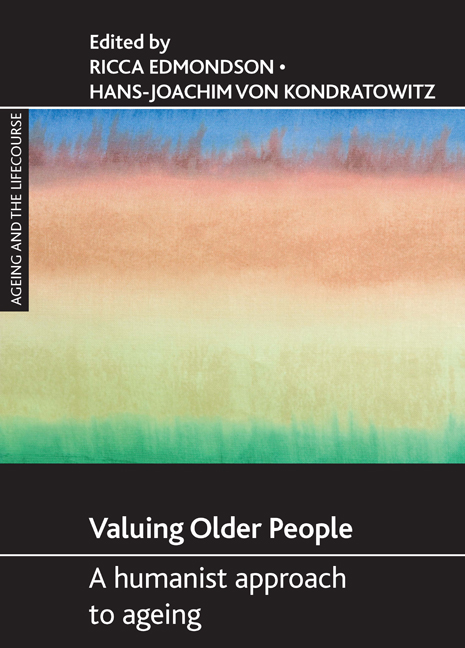Book contents
- Frontmatter
- Contents
- List of tables and figures
- Notes on contributors
- Acknowledgements
- Foreword
- Introduction
- Part One Religion, spirituality, cultural resources and creating meaning
- Part Two Norms, values and gerontology
- Part Three Ageing and wisdom? Conflicts and contested developments
- Afterwords
- Index
- Available titles in the Ageing and the Lifecourse series
five - Beyond dialogue: entering the fourth space in old age
Published online by Cambridge University Press: 05 July 2022
- Frontmatter
- Contents
- List of tables and figures
- Notes on contributors
- Acknowledgements
- Foreword
- Introduction
- Part One Religion, spirituality, cultural resources and creating meaning
- Part Two Norms, values and gerontology
- Part Three Ageing and wisdom? Conflicts and contested developments
- Afterwords
- Index
- Available titles in the Ageing and the Lifecourse series
Summary
Introduction: exiled lives
Conventional wisdom has it that the final words attributed to the famous and infamous emit an aura of immortality by transcending the circumstantial time and place of their utterance. Edward Said's last unfinished book, posthumously published in 2006, not only confers a sense of such ultimate truth, but also, in its contents and contentions, offers a powerful key with which to enter the unfathomable realm of what I shall call the a-temporal territory of the fourth space. The book, entitled On late style: Music and literature against the grain, follows Theodor Adorno's inquiry into Beethoven's late style of composition. In his wake Said develops a concept of timelessness detectable in the last works of great musicians and writers. Contrary to cultural expectations of congruity between life stages and styles of art prevailing along the penultimate phases of the life course, coined by Said ‘timeliness’, the final burst of artistic expression is irreconcilable, discordant, contentious and timeless. It is an a-historical moment, surpassing the annals of epochs and breaking down normative conventions to the extent that, in his words:
… the artist who is fully in command of his medium nevertheless abandons communication with the established social order of which he is a part and achieves a contradictory, alienated relationship with it. His late works constitute a form of exile. (Said, 2006: 5)
Such an exile of lateness, described by Cohen-Shalev (2002: 155) as ‘disintegrated and incommunicable old age style … as a sign of wisdom’, is hence the inspiration for this exploration of the uniqueness of banished existence in the land of the fourth space. The author could initially take a glimpse into that domain, as in so many other cases in which anthropological substance is probed, through stumbling on a seemingly merely methodological hitch.
It should be noted that, for our intents and purposes, any student of human behaviour, especially of the treacherous turf of old age, even if not wearing the coat-of-arms of anthropology, is willingly, or reluctantly, an honorary member of that disciplinary clan of witch hunters, diviners of fuzzy concepts and foragers among the remains of the social in the age-old forest of the wild signposted by old age.
- Type
- Chapter
- Information
- Valuing Older PeopleA Humanist Approach to Ageing, pp. 91 - 104Publisher: Bristol University PressPrint publication year: 2009



